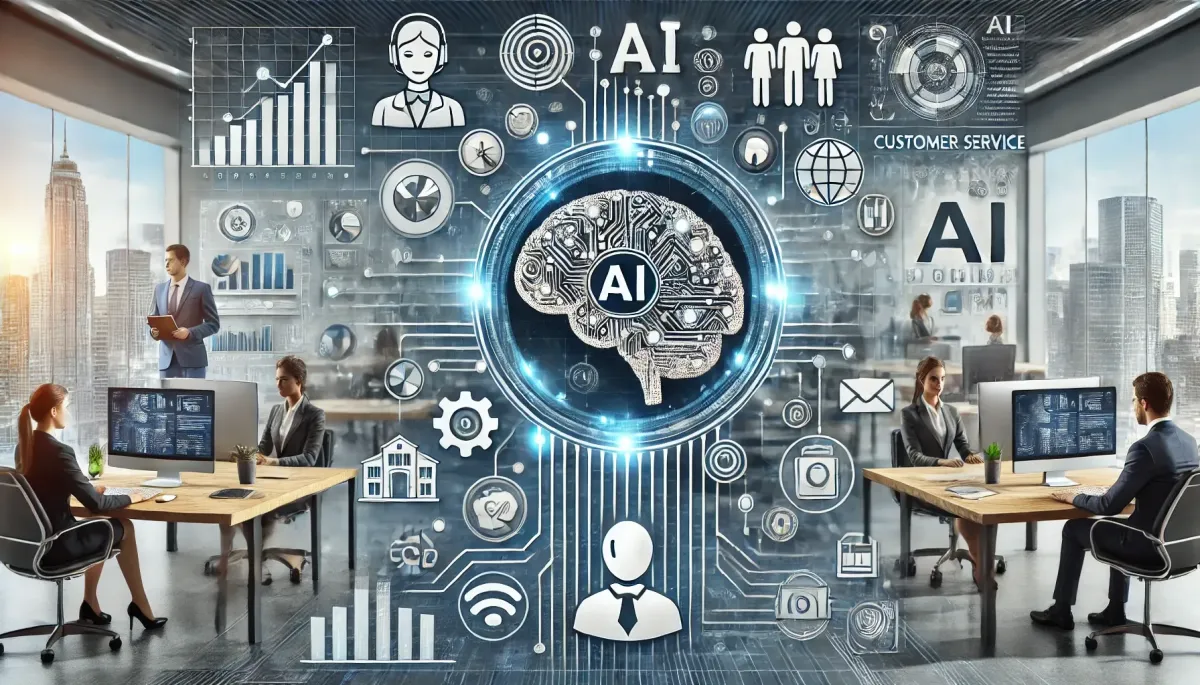Your AI Business Guy, Steven Edwards
Transforming Businesses, One Solution at a Time
AI is not just about automation and data crunching; it's about empowering businesses to make informed decisions.
Your AI Business Guy, Steven Edwards
Transforming Businesses, One Solution at a Time
AI is not just about automation and data crunching; it's about empowering businesses to make informed decisions
AI FOR BUSINESS RESOURCE CENTER

Demystifying AI: Answering Businesses' Biggest Questions
Demystifying AI: Answering Businesses' Biggest Questions
Artificial Intelligence (AI) is at the forefront of modern business innovation, yet many businesses still grapple with understanding its full potential. This blog post addresses the most pressing questions businesses have about AI, offering insights and practical advice.
What Exactly is Artificial Intelligence?
AI encompasses a variety of technologies designed to simulate human intelligence, including machine learning, natural language processing, and robotics. These technologies enable machines to perform tasks that typically require human intelligence, such as understanding language, recognizing patterns, and making decisions.
How Can AI Improve Business Processes?
AI can streamline and enhance various business processes:
Automation of Routine Tasks
AI-driven automation can significantly reduce the time spent on repetitive tasks, allowing employees to focus on more complex projects.
Automating data entry and processing
Streamlining administrative tasks
Managing customer inquiries through AI chatbots
Enhanced Decision-Making
AI algorithms analyze data to provide:
Predictive analytics for market trends
Customer segmentation and targeting
Risk assessment and management
Improved Customer Engagement
AI enhances customer engagement by:
Personalizing customer experiences
Predicting customer needs and preferences
Offering real-time support through virtual assistants
What Industries Benefit the Most from AI?
AI has widespread applications across various industries:
Healthcare: AI assists in diagnostics, personalized medicine, and patient care management.
Finance: AI improves fraud detection, risk management, and customer service.
Retail: AI optimizes inventory management, personalized marketing, and customer service.
How Can AI Help in Data Analysis?
AI excels at processing and analyzing large datasets, providing valuable insights:
Pattern Recognition: Identifying trends and patterns that humans might overlook.
Predictive Analytics: Forecasting future trends based on historical data.
Real-Time Analysis: Offering immediate insights for timely decision-making.
What Should Businesses Consider When Implementing AI?
Implementing AI involves careful consideration of several factors:
Data Quality: High-quality data is crucial for effective AI solutions.
Scalability: Choose AI solutions that can grow with your business.
Ethical Concerns: Ensure AI is used ethically, respecting privacy and avoiding biases.
What Are the Future Trends in AI?
Staying ahead of AI trends can provide a competitive edge:
AI and IoT Integration: Combining AI with the Internet of Things (IoT) for smarter devices and systems.
Edge AI: Implementing AI directly on devices for faster decision-making.
AI in Cybersecurity: Enhancing security measures with AI-driven threat detection and prevention.
AI is reshaping the business landscape, offering transformative potential across industries. By understanding AI's capabilities and implementation strategies, businesses can harness its power to drive innovation and growth.
Work With Steven Edwards Ai Coach!
👉 Book a Coaching Appointment
Let’s explore how AI can transform the way you work. Whether you're new to AI or ready to scale, Steven is here to guide you.
👉 Learn More About AI with this Course
Dive into The AiMBA MasterClass and Certification to master AI tools and techniques and step into the future with confidence.

Demystifying AI: Answering Businesses' Biggest Questions
Demystifying AI: Answering Businesses' Biggest Questions
Artificial Intelligence (AI) is at the forefront of modern business innovation, yet many businesses still grapple with understanding its full potential. This blog post addresses the most pressing questions businesses have about AI, offering insights and practical advice.
What Exactly is Artificial Intelligence?
AI encompasses a variety of technologies designed to simulate human intelligence, including machine learning, natural language processing, and robotics. These technologies enable machines to perform tasks that typically require human intelligence, such as understanding language, recognizing patterns, and making decisions.
How Can AI Improve Business Processes?
AI can streamline and enhance various business processes:
Automation of Routine Tasks
AI-driven automation can significantly reduce the time spent on repetitive tasks, allowing employees to focus on more complex projects.
Automating data entry and processing
Streamlining administrative tasks
Managing customer inquiries through AI chatbots
Enhanced Decision-Making
AI algorithms analyze data to provide:
Predictive analytics for market trends
Customer segmentation and targeting
Risk assessment and management
Improved Customer Engagement
AI enhances customer engagement by:
Personalizing customer experiences
Predicting customer needs and preferences
Offering real-time support through virtual assistants
What Industries Benefit the Most from AI?
AI has widespread applications across various industries:
Healthcare: AI assists in diagnostics, personalized medicine, and patient care management.
Finance: AI improves fraud detection, risk management, and customer service.
Retail: AI optimizes inventory management, personalized marketing, and customer service.
How Can AI Help in Data Analysis?
AI excels at processing and analyzing large datasets, providing valuable insights:
Pattern Recognition: Identifying trends and patterns that humans might overlook.
Predictive Analytics: Forecasting future trends based on historical data.
Real-Time Analysis: Offering immediate insights for timely decision-making.
What Should Businesses Consider When Implementing AI?
Implementing AI involves careful consideration of several factors:
Data Quality: High-quality data is crucial for effective AI solutions.
Scalability: Choose AI solutions that can grow with your business.
Ethical Concerns: Ensure AI is used ethically, respecting privacy and avoiding biases.
What Are the Future Trends in AI?
Staying ahead of AI trends can provide a competitive edge:
AI and IoT Integration: Combining AI with the Internet of Things (IoT) for smarter devices and systems.
Edge AI: Implementing AI directly on devices for faster decision-making.
AI in Cybersecurity: Enhancing security measures with AI-driven threat detection and prevention.
AI is reshaping the business landscape, offering transformative potential across industries. By understanding AI's capabilities and implementation strategies, businesses can harness its power to drive innovation and growth.
Work With Steven Edwards Ai Coach!
👉 Book a Coaching Appointment
Let’s explore how AI can transform the way you work. Whether you're new to AI or ready to scale, Steven is here to guide you.
👉 Learn More About AI with this Course
Dive into The AiMBA MasterClass and Certification to master AI tools and techniques and step into the future with confidence.
